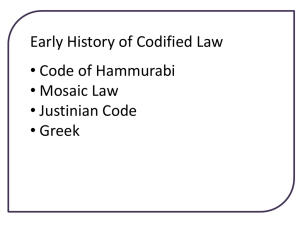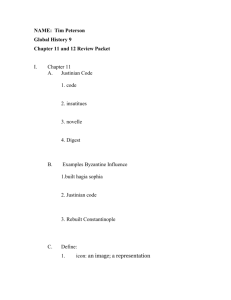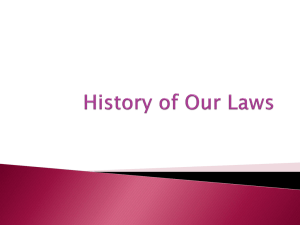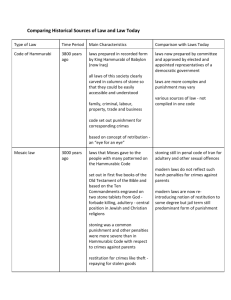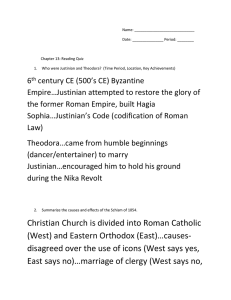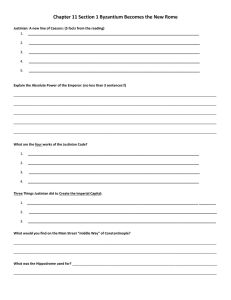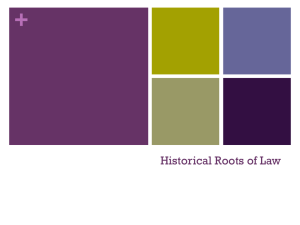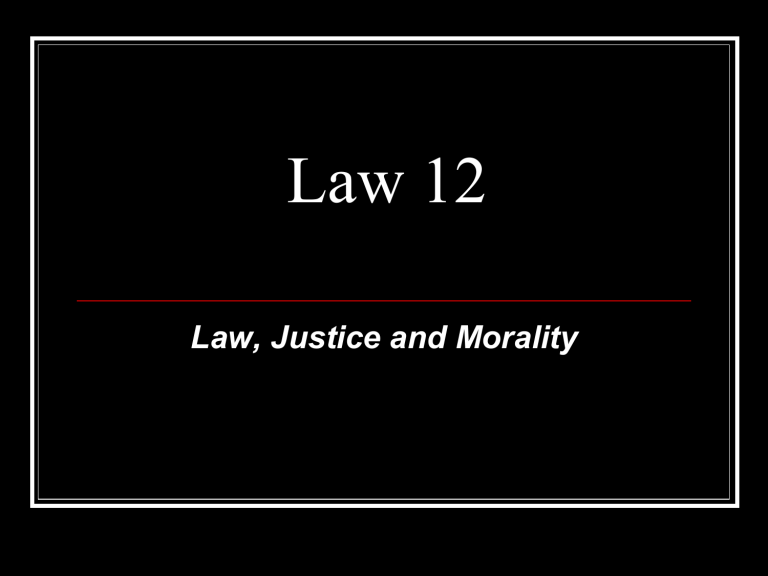
Law 12 Law, Justice and Morality Justice What is just? Justice Is it “just” that people who commit crimes should have to pay for the damage they cause? California Restitution Law Justice How important is fault? Is someone with a mental disorder at fault? Luka Magnotta Blame - Radiolab Justice Treat like cases alike and different cases differently Don’t discriminate on the basis of irrelevant characteristics Justice must be impartial (regardless of position or status) Law must conform to society’s standards or beliefs Morality What are the sources of moral values? Morality What are you okay with? Dilemma Areas Sexuality Drugs Evolving Standards Historical Roots Napoleonic Code (1804) Commissioned by Napoleon Combined Justinian Code and Germanic Law Spread as he conquered Still the basis of French law (and Quebec’s) today Influences on Canadian Law British Law is most significant Right down to courtroom setup Quick Review -- Questions What is a codified law? Name two examples of codified laws. What is the difference between restitution and retribution? Whose name gave rise to the word “justice”, and why? Quick Review -- Answers Codified means written down and numbered (listed). Code of Hammurabi, Mosaic Law, Justinian’s Code, Napoleonic Code, Criminal Code, Human Rights Code Restitution seeks to restore the victim; retribution seeks to punish or exact vengeance on the wrongdoer. Justinian I (Byzantine Emperor 529 AD). He created Justinian’s Code British Law Originally Roman Law (43 - 410 AD) British Law – Dark Ages Trial by Ordeal Relied on torture and “God’s Judgment.” Trial by hot iron, trial by hot water, trial by cold water Outcome would determine guilt or innocence Trial by Oath Helping Less serious charges Line up friends to swear you wouldn’t do that British Law – Dark Ages Trial by Combat Introduced by Normans (1066) Duel to prove guilt or innocence Practice of hiring a “representative” developed British Law The Feudal System 1066 – William the Conqueror invades Rule by “Divine Right” Feudal system was instituted Local lords decided disputes Inconsistent Law British Law Henry II (1154-1189) Sought consistency Appointed first judges Travelled from place to place No codified laws so judges relied on existing traditions and sense of fairness Judges noticed similarities and decided that similar cases should be decided in similar ways. British Law Judges began recording cases and decisions to assist Gave birth to “case law” or “common law” (information was common to all Rule of precedent or stare decisis arose The Rule of Law King John (son of Henry II) was forced to sign the Magna Carta in 1215 The King was now bound by the law The origin of the “RULE OF LAW” The law rules, not the king Also recognized habeas corpus (right to appearance in court within a reasonable time) The Rule of Law 1. 2. 3. The law is necessary to regulate society (Manitoba Languages Act Case) The Law applies equally to everyone and no one is above the law No-one can exercise unrestricted power and take away our rights except in accordance with law (Roncarelli v. Duplessis p.15)
